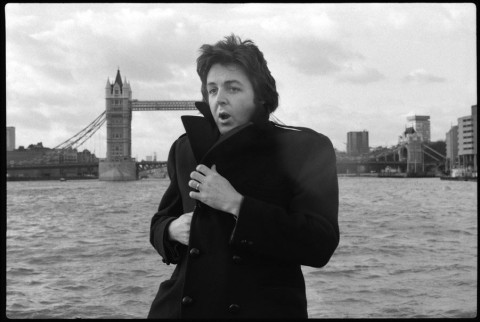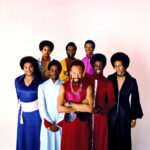With the release of Pure McCartney, a definitive collection celebrating Paul McCartney’s solo and Wings eras, we delve into 20 standout tracks that highlight his remarkable post-Beatles journey. This list, drawing inspiration from the original selection, expands on each song, offering a richer exploration for fans and new listeners alike. From heartfelt ballads to rock anthems, these Paul Mccartney And Wings Songs showcase his enduring musical genius.
Maybe I’m Amazed
Paul McCartney’s raw and powerful declaration of love to Linda McCartney, “Maybe I’m Amazed,” first appeared on his self-titled debut solo album, McCartney. Released in 1970, this song is a testament to his emotional depth and songwriting prowess. Despite not being initially released as a single, it quickly became a fan favorite and a staple of his live performances. The song’s enduring appeal is evident in covers by artists like The Faces and Sandie Shaw in 1971, solidifying its status as an instant classic. Its passionate vocals and building instrumentation make it a timeless love song.
 Paul McCartney performing Maybe I'm Amazed, a classic love song from his solo career.
Paul McCartney performing Maybe I'm Amazed, a classic love song from his solo career.
Heart Of The Country
From the 1971 album RAM, a collaborative effort with Linda McCartney, “Heart Of The Country” is a pastoral escape. This Paul McCartney song perfectly captures the essence of rural tranquility and domestic bliss. It’s a melodic gem that reflects a simpler life, away from the chaos of fame. The gentle acoustic arrangement and McCartney’s warm vocals create a cozy atmosphere, inviting listeners into his idyllic world. While a 2013 re-recorded version for a Linda McCartney Foods advert exists, the original remains the definitive and most charming rendition.
Wild Life
The title track from Wings’ debut album, Wild Life (1972), is an intriguing and somewhat raw offering. Coming after the polished RAM, the Wild Life album was deliberately more spontaneous and less refined. The song “Wild Life” itself stands out with its unique, almost primal energy. It’s a departure from typical Paul McCartney songs, featuring a yearning quality and a loose, jam-like structure. Considered by some as a protest song, it certainly possesses more artistic merit than the overtly political “Give Ireland Back To The Irish,” showcasing a different side of McCartney’s songwriting.
Single Pigeon
“Single Pigeon,” from Wings’ Red Rose Speedway (1973), is a masterclass in crafting a charming and poignant miniature. Paul McCartney’s ability to take a simple concept, like a lonely pigeon, and turn it into a memorable tune is on full display here. This song, though slight in its composition, is remarkably effective in its emotional impact. Its gentle melody and heartfelt lyrics make it a standout track on the album, proving that even the simplest ideas can become beautiful songs in McCartney’s hands.
Jet
“Jet,” a high-energy single from Band on the Run (1973), is undeniably one of Paul McCartney and Wings’ biggest hits. This song exemplifies McCartney’s knack for creating instantly catchy and powerful rock songs. The driving rhythm, coupled with Tony Visconti’s horn arrangements (initially uncredited), makes “Jet” an explosive track. Its enduring popularity is evident in its consistent presence in live sets and its status as a classic rock staple. The raw energy of the Wogan BBC TV performance in 1987 further underscores the song’s live appeal.
Letting Go
Despite being a single from Venus and Mars (1975), “Letting Go” was surprisingly not a major hit upon its release. This powerful, blues-infused track deserved far more recognition than it initially received. “Letting Go” showcases Wings’ versatility and McCartney’s willingness to explore different musical styles. Its funky groove and dynamic arrangement make it a standout track from the Venus and Mars album. The live performance from the Wings Over America tour captures the song’s raw energy and demonstrates its potential as a concert highlight.
The Note You Never Wrote
“The Note You Never Wrote,” from Wings at the Speed of Sound (1976), is a hauntingly beautiful ballad. On an album known for its democratic approach, with each member contributing vocals, this track, written by Paul McCartney and sung by Denny Laine, is a standout. Laine’s vocals bring a delicate vulnerability to the song, enhancing its emotional depth. “The Note You Never Wrote” is a testament to McCartney’s ability to write poignant and introspective songs, even within the context of a band effort. Denny Laine’s “Time To Hide” from the same album is another example of the album’s diverse strengths.
Name and Address
“Name and Address,” an album track from London Town (1978), is a fun, rockabilly-inspired tune with an interesting backstory. Reportedly written for Elvis Presley, it’s easy to imagine The King putting his spin on this energetic track. Paul McCartney’s lead guitar work adds to the song’s lively feel, making it a hidden gem within the London Town album. Although Elvis never recorded it due to his passing, “Name and Address” remains a testament to McCartney’s ability to write in various styles and his admiration for rock and roll pioneers.
Winter Rose / Love Awake
From Back to the Egg (1979), “Winter Rose / Love Awake” is an underrated medley that highlights McCartney’s penchant for combining musical fragments into cohesive pieces. This ballad combo, despite criticisms of McCartney’s medley approach, is beautifully crafted and emotionally resonant. “Winter Rose / Love Awake” showcases his melodic gifts and his ability to create seamless transitions between contrasting musical ideas. It’s a testament to his compositional skills and his willingness to experiment with song structure, much like the album’s other medley, “After The Ball / Million Miles.”
Coming Up
“Coming Up,” from McCartney II (1980), is arguably Paul McCartney’s finest post-Beatles single. This incredibly catchy and innovative pop song is made even more impressive by the fact that McCartney wrote and recorded it entirely himself. The studio version, initially favored, was flipped for the live version from Glasgow in the US due to record company preference. John Lennon himself praised “Coming Up,” preferring the home-recorded “freak version,” highlighting its unique appeal. This track showcases McCartney’s ability to reinvent himself and create cutting-edge music even in his solo endeavors.
Take It Away
“Take It Away,” the second single from Tug Of War (1982), has aged remarkably well. This song, unlike the perhaps more commercially driven “Ebony and Ivory,” is a masterclass in production and songwriting. “Take It Away” features a sophisticated arrangement, catchy melody, and a memorable music video. Despite its quality and enduring appeal, it remains surprisingly absent from McCartney’s live performances, making it a beloved gem for fans.
Pipes of Peace
The title track from Pipes of Peace (1983), “Pipes of Peace,” secured Paul McCartney his last solo number one single in the UK in January 1984, following the success of “Say Say Say” with Michael Jackson in the US. This song, with its message of peace and unity, became a chart-topping hit. Like “Take It Away,” “Pipes of Peace” has been curiously absent from his concert setlists, despite its popularity and significant place in his discography.
No More Lonely Nights
“No More Lonely Nights,” from the soundtrack of the film Give My Regards To Broad Street, is a classic McCartney ballad. Despite the film’s poor reception, the song itself is a standout, largely recorded live and featuring David Gilmour on guitar and Anne Dudley on keyboards. “No More Lonely Nights” showcases McCartney’s enduring talent for writing timeless love songs. Another track surprisingly absent from his live shows, it remains a beloved single from the mid-80s.
Footprints
From Press to Play (1986), “Footprints” is a highlight from an album that saw Paul McCartney experiment with a more modern sound, collaborating with producer Hugh Padgham. Co-written with Eric Stewart of 10cc, “Footprints” is a strong track from an album that, despite its contemporary production, struggled commercially. “Footprints,” like many songs on Press to Play, is a testament to McCartney’s continued songwriting craft, even as he explored new sonic territories.
My Brave Face
“My Brave Face,” the lead single from Flowers in the Dirt (1989), marked a strong return for McCartney, in collaboration with Elvis Costello. This McCartney-Costello composition brought McCartney back to the charts with a well-received single. “My Brave Face” combines McCartney’s melodic sensibilities with Costello’s lyrical edge, resulting in a dynamic and memorable song. While it didn’t reach the heights of his earlier hits, it signaled a creative resurgence for McCartney in the late 80s.
Mistress and Maid
“Mistress and Maid,” another McCartney/McManus (Costello) collaboration, is a standout track from the uneven Off The Ground (1993) album. This song showcases the continued fruitful partnership between McCartney and Costello. While McCartney chose “Winedark Open Sea” for the Pure McCartney compilation from this album, “Mistress and Maid” is arguably a more compelling and representative track, highlighting the album’s stronger moments.
Young Boy
“Young Boy,” the first single from Flaming Pie (1997), is surprisingly absent from the 4CD Pure McCartney despite eight other tracks from the album being included. This is a puzzling omission, as “Young Boy” is a strong and catchy single. It was McCartney’s last single solely credited to him to reach the UK top 20 singles chart, marking a significant moment in his later solo career. Its upbeat tempo and infectious melody make it a quintessential McCartney track.
This Never Happened Before
“This Never Happened Before,” from Chaos and Creation in the Backyard (2005), is a beautiful album closer and a highlight of McCartney’s 21st-century work. This song, featured in the film The Lake House, represents a return to form after the less acclaimed Driving Rain. “This Never Happened Before” is a tender and emotionally resonant ballad, showcasing McCartney’s enduring songwriting talent and his ability to create moving and personal songs.
Only Mama Knows
“Only Mama Knows,” from Memory Almost Full (2007), is a raw and energetic track that channels a classic Wings vibe. Despite not being released as a single, it became a live favorite and a testament to the album’s rockier edge. Paul McCartney clearly recognized its strength, regularly performing it live, including a notable appearance on Jools Holland’s show. “Only Mama Knows” demonstrates McCartney’s ability to still deliver powerful, guitar-driven rock songs late in his career.
Alligator
“Alligator,” from New (2013), is a standout track from an album that defied expectations. Produced by Mark Ronson, “Alligator” is a dynamic and inventive song that many consider the best on the album. Its RAM-like qualities in guitar work and composition draw comparisons to McCartney’s earlier solo work, highlighting a creative resurgence and a return to form. “Alligator” showcases McCartney’s continued ability to innovate and create fresh, exciting music.
These 20 songs represent just a fraction of Paul McCartney’s incredible post-Beatles output with Wings and as a solo artist. Pure McCartney serves as a fantastic entry point into this vast catalog, inviting both longtime fans and new listeners to explore the depth and breadth of his musical legacy. From chart-topping hits to hidden gems, these Paul McCartney and Wings songs continue to resonate and inspire.

